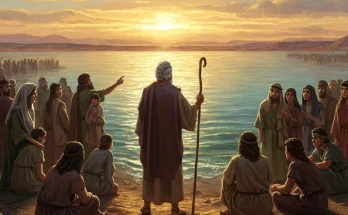- Writer of the book of Judges
- Date Written
- To Whom Written
- Purpose of the book of Judges
- Historical Context
- Key Themes of the book of Judges
- Major Events/Stories of the Book of Judges
- Theological Contributions of the Book of Judges
- Special Consideration in the Book of Judges
- Book of Judges Conclusion
- Frequently Asked Questions (FAQs) about the Book of Judges
Have you ever wondered why the Israelites, after being delivered from Egypt, kept falling back into sin? The Book of Judges answers that question, showing us Israel’s struggle to stay faithful to God. After Joshua’s leadership, the nation lacked strong guidance and fell into a cycle of rebellion, oppression, repentance, and deliverance. God raised up judges—heroes and leaders like Deborah, Gideon, and Samson—to rescue His people during times of crisis.
The Book of Judges is one of the most fascinating books in the Old Testament. It reveals God’s patience, mercy, and faithfulness even when His people failed Him. As we study these stories, we see God’s power to deliver, even when Israel seemed determined to fall into disobedience. The book gives us valuable lessons about the importance of godly leadership and the consequences of straying from God’s path.
In this outline, we’ll dive into the major events, key themes, and theological lessons from the Book of Judges. Together, let’s explore how these ancient stories still speak powerfully to us today.
Writer of the book of Judges
The writer of the Book of Judges is traditionally unknown. While the text itself does not name an author, many scholars and Jewish traditions attribute the writing to Samuel, the prophet and last judge of Israel. Samuel, who lived after many of the events in the Book of Judges, may have compiled these stories to preserve the history and lessons of Israel’s early leaders.
The Book of Judges likely drew from oral traditions passed down over generations. These stories were shared among the tribes of Israel, recounting how God raised up leaders, or judges, to deliver the people in times of trouble. Over time, these accounts were written down, preserving the cycle of Israel’s sin, judgment, repentance, and deliverance.
While the author remains uncertain, the message of the Book of Judges is clear. It offers a vivid account of Israel’s history, showing both the consequences of disobedience and God’s enduring mercy. The likely compilation by Samuel or another leader emphasizes the importance of remembering Israel’s past, teaching us valuable lessons about faith, leadership, and reliance on God today.
Date Written
The Book of Judges was likely written between 1045 and 1000 BC, during the early years of Israel’s monarchy. The events recorded in the Book of Judges span a period of roughly 300 to 350 years after Joshua’s death and before Israel had a king. This time is often called the “period of the judges” because Israel had no central government, and God raised up judges to lead and deliver the people during crises.
During this time, Israel was loosely organized into tribes, facing constant threats from surrounding nations like the Canaanites, Philistines, and Midianites. The judges were both military leaders and spiritual guides, called by God to restore Israel when the people repented from their disobedience.
The writing of the Book of Judges likely took place after the events had been passed down through oral traditions and stories. Jewish tradition suggests that Samuel, the last judge and a prophet, may have written or compiled these stories during his lifetime, just before the rise of King Saul. By this time, Israel was transitioning from tribal leadership to the monarchy, and the Book of Judges serves as a historical record of that critical time in Israel’s development.
To Whom Written
The Book of Judges was written to the Israelites, God’s chosen people. Its purpose was to remind them of their covenant relationship with God and the serious consequences of disobedience. During the time covered in the Book of Judges, Israel often fell into cycles of rebellion, oppression, repentance, and deliverance. The stories of the judges show how God intervened when the people cried out to Him, sending leaders like Deborah, Gideon, and Samson to deliver them from their enemies.
The Book of Judges serves as both a warning and a lesson for the Israelites. It highlights the dangers of forgetting God’s laws and following the practices of surrounding nations. Through these stories, the Israelites were reminded of their responsibility to remain faithful to God and the blessings that come from obedience. At the same time, it shows the severe consequences that occur when they turn away from Him.
Although the Book of Judges was written for the Israelites, its lessons resonate with believers today. It serves as a powerful reminder of God’s mercy and patience, yet also warns of the consequences when we stray from His path.
Purpose of the book of Judges
The Book of Judges serves a vital purpose in revealing Israel’s recurring cycle of sin, oppression, repentance, and deliverance. It showcases the spiritual and moral struggles of the Israelites during a time when they lacked a central, godly leader. Each time the people strayed from God, they faced oppression from surrounding nations. However, when they repented and cried out to God, He raised up judges—leaders like Deborah, Gideon, and Samson—to deliver them from their enemies.
The Book of Judges emphasizes God’s faithfulness, even when Israel was unfaithful. Despite their repeated disobedience and turning to other gods, God continued to rescue His people when they returned to Him. This cycle highlights both the consequences of sin and the mercy of God.
Another important purpose of the Book of Judges is to demonstrate the need for righteous leadership and obedience to God. Without strong, godly leaders, the people drifted into chaos and idolatry. The book ultimately points to the need for a greater leader, foreshadowing the eventual kingship in Israel and ultimately the coming of Jesus Christ, the perfect leader and deliverer.
Through the Book of Judges, we see the importance of faithfulness to God and the dangers of turning away from His guidance.
Historical Context
The Book of Judges is set in the period after the death of Joshua, Israel’s great military leader, and before the establishment of kings in Israel. During this time, Israel had no central government, and the tribes operated as loosely connected groups. Without a strong, unified leadership, the nation often struggled to maintain obedience to God’s laws, leading them into repeated cycles of rebellion and sin.
This period was marked by frequent conflicts with surrounding nations such as the Canaanites, Midianites, and Philistines. These nations not only posed military threats but also tempted Israel to adopt their pagan practices, which led to spiritual and moral decline. As a result, Israel experienced constant turmoil, with enemies oppressing them as a consequence of their disobedience.
In response to the Israelites’ cries for help, God raised up judges—military and spiritual leaders—to deliver them from oppression. However, these judges were temporary solutions, and the cycle of sin and deliverance continued throughout the period. The Book of Judges offers insight into the instability and challenges Israel faced without a king or a godly central leader, paving the way for the later demand for a monarchy and highlighting the need for consistent faithfulness to God.
Key Themes of the book of Judges
The Book of Judges presents key themes that remain relevant for understanding God’s relationship with His people. One of the central themes is Israel’s repeated cycle of sin, judgment, repentance, and deliverance. Over and over, the Israelites disobeyed God, adopting the practices of surrounding pagan cultures and turning away from His commandments. In response, God allowed them to be oppressed by neighboring nations. However, when the people repented and cried out for help, God, in His mercy, raised up a judge to deliver them.
This cycle reveals another key theme: God’s mercy and faithfulness. Despite Israel’s persistent unfaithfulness, God never abandoned His people. He continually provided deliverance, demonstrating His patience and love even when the Israelites repeatedly failed to uphold their covenant with Him.
Leadership plays a vital role in the Book of Judges. When strong, godly leaders were in place, the people thrived. However, when there was no effective leadership, Israel quickly fell into disobedience and chaos. This highlights the importance of righteous leadership and the consequences of moral failure.
Lastly, the Book of Judges warns of the dangers of moral and spiritual compromise. The Israelites frequently fell into sin by adopting the practices of surrounding pagan cultures, showing the devastating effects of drifting away from God’s commands. The book calls us to remain faithful and resist the pressures of a world that pulls us away from God’s truth.
Major Events/Stories of the Book of Judges
The Book of Judges contains several major events and stories that showcase Israel’s recurring cycle of sin and God’s deliverance through chosen leaders, or judges.
The first judge, Othniel (Judges 3:7-11), delivered Israel from oppression by the king of Aram. His victory set a precedent for God raising up leaders in times of need.
Next is the story of Ehud, who defeated the Moabites (Judges 3:12-30). Using a clever plan, Ehud killed King Eglon of Moab and led Israel to victory, bringing peace for 80 years.
Deborah, the only female judge, led alongside Barak to secure victory over the Canaanites (Judges 4–5). This battle, marked by divine intervention, was significant in establishing God’s power to deliver His people through even the most unexpected leaders.
One of the most famous judges is Gideon, who defeated the Midianites (Judges 6–8). Despite his initial doubts, Gideon trusted God and led a small army to victory, demonstrating God’s ability to win battles through unconventional means.
Jephthah delivered Israel from the Ammonites (Judges 11–12). His story is bittersweet due to his tragic vow, which highlights the importance of careful words and promises.
Lastly, Samson is well-known for his incredible strength and struggles with the Philistines (Judges 13–16). Despite personal failures, Samson’s final act of destruction against the Philistines was a powerful moment of deliverance for Israel.
These stories in the Book of Judges reveal God’s enduring faithfulness and His ability to work through imperfect leaders to rescue His people.
Theological Contributions of the Book of Judges
The Book of Judges offers significant theological contributions that help us understand God’s character and His relationship with His people.
First, the Book of Judges presents God as the ultimate judge and deliverer. Though God raised up human judges to lead Israel during crises, it was ultimately God who delivered His people from their enemies. This highlights God’s direct involvement in their affairs and His role as their true leader, even when human leaders were flawed.
Another key theological insight is the sovereignty of God over Israel’s enemies. Throughout the book, we see that God is not only in control of Israel but also has authority over the nations surrounding them. Whether the Israelites faced the Canaanites, Midianites, or Philistines, God used these nations as instruments of judgment and, at times, as tools to bring Israel to repentance.
The Book of Judges also emphasizes the consequences of Israel’s disobedience to the covenant. Each time Israel turned away from God, they faced oppression and hardship. This pattern shows the importance of remaining faithful to God’s commandments and the devastating impact of disobedience.
Lastly, the book foreshadows the need for a righteous king. The final verse of Judges (21:25) points to the chaos that ensues when “everyone did as they saw fit.” This foreshadowed the coming monarchy, where Israel would seek a king to bring order and consistent leadership, ultimately pointing to the future kingship of Jesus Christ.
Through these insights, the Book of Judges teaches us about God’s justice, mercy, and His desire for righteous leadership and obedience.
Special Consideration in the Book of Judges
The Book of Judges contains several special considerations that offer unique insights into Israel’s history and spiritual condition during this period.
One of the most striking aspects of the Book of Judges is Israel’s moral and spiritual decline without strong leadership. Without a central, godly leader, the nation continually fell into disobedience, idolatry, and chaos. The phrase “everyone did as they saw fit” (Judges 21:25) illustrates the disorder and moral corruption that arose when Israel lacked guidance. This decline highlights the importance of godly leadership to keep people grounded in faith and obedience to God’s commandments.
Another special consideration is the role of women in leadership, particularly seen through Deborah. As a judge and prophet, Deborah stands out as a courageous leader who guided Israel to victory over the Canaanites (Judges 4–5). Her role challenges common perceptions of leadership in ancient Israel, showing that God can use anyone, regardless of gender, to fulfill His purposes.
Lastly, Samson is a particularly complex figure in the Book of Judges. Although he was set apart by God as a Nazirite and blessed with extraordinary strength, Samson was personally flawed. His impulsive behavior and poor judgment, especially in his relationships, led to personal and national consequences. Yet, in his final moments, Samson fulfilled his calling by delivering Israel from the Philistines, showing how God can work through imperfect people to accomplish His will.
These special considerations add depth to the Book of Judges, illustrating both the potential and struggles of leadership, faithfulness, and human weakness.
Book of Judges Conclusion
The Book of Judges vividly underscores Israel’s desperate need for godly leadership and their recurring struggle to remain faithful to God. The final verse, Judges 21:25, encapsulates the spiritual condition of the nation: “In those days Israel had no king; everyone did as they saw fit.” This chaotic state of moral and spiritual decline reveals what happens when people stray from God’s guidance and try to lead themselves without righteous direction.
The Book of Judges is not only a historical record but also a powerful reminder of God’s patience, justice, and mercy. Despite Israel’s repeated disobedience, God continually raised up leaders to deliver them, demonstrating His unwavering commitment to His people. The book reveals both the consequences of turning away from God and His enduring grace when His people repent.
Today, the Book of Judges remains relevant in showing us the importance of faithful leadership and the dangers of compromising with the world around us. It reminds us that God is always faithful, and His justice and mercy are constant, even in the face of our failures. Ultimately, the book points us toward the need for a perfect leader—fulfilled in Jesus Christ, the true and eternal King.
Frequently Asked Questions (FAQs) about the Book of Judges
What is the main message of the Book of Judges? The Book of Judges highlights Israel’s cycle of sin, oppression, repentance, and deliverance. It shows God’s mercy and faithfulness despite Israel’s repeated unfaithfulness and emphasizes the need for godly leadership.
Who were the judges, and what was their role? The judges were leaders raised by God to deliver Israel from oppression. They acted as military leaders, spiritual guides, and, at times, judges in legal matters. Each judge was called by God to lead in times of national crisis.
Why is the Book of Judges important in the Old Testament? The Book of Judges bridges the period between Joshua’s leadership and the establishment of the monarchy. It illustrates the consequences of Israel’s disobedience and foreshadows the need for a king to bring order and righteousness to the nation.
What does the Book of Judges teach us about leadership? The Book of Judges shows the importance of strong, godly leadership. When Israel lacked effective leaders, they fell into disobedience and chaos, underscoring the need for leaders who follow God’s guidance.
What is the spiritual significance of the cycle of sin and deliverance in Judges? The cycle of sin and deliverance in the Book of Judges reveals God’s patience and grace. It reminds us that even when we fail, God is merciful and willing to restore us if we repent and turn back to Him.



